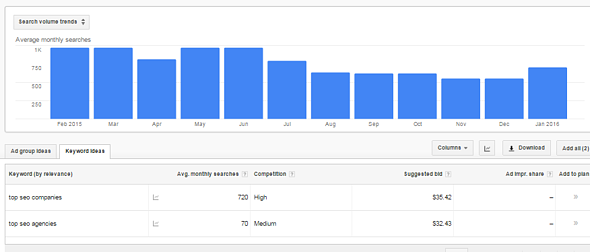Why keyword research is important for SEO
No matter what you do on your website or blog, if people can’t find it, they’ll never come. And that’s why keyword research is so important for SEO – it’s the foundation on which all other optimization and marketing efforts are built.
What is keyword research?
When you’re looking to rank higher in search engine results pages (SERPs), keyword research is key. Keyword research involves studying the habits of users who are searching for information related to your business or niche.
By identifying the right keywords, you can create content that is optimized for those terms and attract more visitors.
Here are some things to keep in mind when conducting keyword research:
- Identify the main topics people are interested in discussing on Google.
- Research what keywords are most frequently used on websites that are relevant to your industry.
- Determine which keywords are most likely to generate traffic for your site.
- Generate a list of long-tail keywords that could be useful for promoting your site or product.
The different types of keywords
When it comes to SEO, one of the most important things you can do is research the right keywords. And not just any keywords – the right ones for your website and content.
There are a few different types of keywords you need to consider when ranking in search engines:
- Keywords relevant to your brand or product.
- Keywords that people might type into Google search if they’re looking for information on that topic.
- Keywords that are related to your niche but aren’t specific to your brand or product.
- Comprehensive phrases that could be used as either a keyword or a domain name (e.g., “SEO advice”).
- Phrases that are closely related to what people are searching for but are still unique (e.g., “web development Phoenix”).
- Buzzword-rich phrases (e.g., “social media optimization”).
- Terms that are closely associated with your industry, but not necessarily specific to it (e.g., “internet marketing”).
- Negative keywords (i.e., words that you want to exclude from your search results).

The most important thing is to make sure that the keywords you choose are relevant to your website and content. Otherwise, you’ll waste your time and energy trying to rank for terms that aren’t really important to your audience.
There are a few different ways to find keywords that are relevant to your brand or product:
- brainstorm a list of words that describe what your business does (e.g., “customer service,” “business consulting,” “marketing services”)
- research popular topics that are related to what you do (e.g., “web development,” “social media marketing,” “online advertising”)
- use keyword research tools like Google AdWords Keyword Planner or Long Tail Pro to find long-tail keywords that are related to your niche but aren’t specific to your brand or product (e.g., “digital marketing,” “branding agencies,” “SEO services Phoenix”).
- run competitor analysis and look for terms that they have used in their titles and descriptions (e.g., “web design Phoenix,” “SEO services Phoenix”).
- ask your customers what keywords they might use when searching for information about what you do (e.g., “customer service online,” “web development Phoenix”).
Once you have a list of potential keywords, it’s important to test them out in a Google search to see which ones are the most relevant and useful for your website and content.
There are a few different ways to test out a keyword:
- run a simple search on your own website using that keyword (e.g., “web development Phoenix”)
- run a search using Google AdWords with that keyword as the ad title and budget (e.g., “Web development Phoenix $5 per click”)
- run a search using Google AdWords with that keyword as the ad copy (e.g., “Looking for web development in Phoenix? We can help!”)
- run a search using SEMrush to see which keywords are getting the most traffic from organic search results (i.e., not paid ads) (e.g.,“SEO services Phoenix”).
How to do keyword research
One of the most important aspects of SEO is knowing what keywords to target. keyword research is essential for narrowing down which keywords to use in your content and on your website. There are a few different ways to do keyword research, and each method has its own benefits and drawbacks. Here’s a look at three methods for doing keyword research:
1. Keyword analysis tools
One of the most popular ways to do keyword research is through keyword analysis tools. These tools allow you to enter in a list of keywords, and they will show you how often they’ve been searched for, how much traffic they generate, and more. This information can help you determine which keywords are worth targeting with your content and website.
2. Google AdWords Keyword Planner
Google AdWords Keyword Planner is another great way to target keywords. You can enter in a list of keywords, and it will show you how much competition there is for each one, as well as how much money you could make if you started advertising with those keywords. This information can help you determine which keywords are worth targeting with your content and website.

3. Google Trends
Google Trends is another great way to determine which keywords are in high demand. You can use this tool to see how often the keyword has been searched for over time, and you can also see how much traffic it’s generating. This information can help you determine which keywords are worth targeting with your content and website.
Whichever method you choose, be sure to follow all the guidelines outlined in our guide to SEO. This will help you ensure that your content and website are optimized for search engines, and that you’re getting the most out of your keyword research.
The benefits of keyword research for SEO
When it comes to online marketing, keyword research is one of the most important aspects of your strategy. Keyword research helps you find and rank for the right keywords in order to drive traffic to your website. Here are a few reasons why keyword research is so important for SEO:
- You’ll be able to target the right audience: One of the biggest benefits of keyword research is that you’ll be able to target your site’s content specifically to the people who are looking for what you have to offer. By targeting the right keywords, you’ll improve your site’s visibility and potentially increase traffic by up to 500%.
- You’ll improve site quality: By focusing on high-quality, relevant keywords, you’ll help improve the overall quality of your site. This will lead to higher rankings in search engines, which in turn will bring in more visitors.
- You’ll reduce advertising costs: By targeting specific keywords, you’ll save money on advertising expenses. Not only that, but by improving site quality and ranking higher in search engines, you’ll also increase the chances of attracting organic traffic.
- You’ll improve site engagement: By targeting relevant keywords, you’ll make your site more engaging and likely to generate leads and sales. In addition, better rankings will attract more web traffic, which in turn will increase site engagement.
- You’ll reduce website development costs: By improving site quality and ranking higher in search engines, you’ll reduce the need for expensive website development costs. This will free up money that can be spent on other marketing initiatives or increased employee productivity.
- You’ll improve website speed: By ranking higher in search engines, you’ll improve your site’s speed. This will help reduce user frustration and increase conversions.
- You’ll reduce website costs: By targeting relevant keywords, you’ll reduce the need for expensive marketing campaigns or website design solutions. In addition, better rankings will attract more web traffic, which in turn will reduce website development costs.
- You’ll improve brand visibility: By ranking higher in search engines, you’ll become more visible to potential customers. This in turn will help increase brand awareness and improve your chances of attracting new customers.
- You’ll improve site security: Improved website security is a result of improved site speed and rankings. By ranking higher in search engines, you’ll improve the security of your site and reduce the risk of online theft or cyberattacks.
- You’ll improve your bottom line: By targeting the right keywords and improving site quality, you’ll reduce the need for expensive marketing campaigns or website design solutions. In addition, better rankings will attract more web traffic, which in turn will increase site engagement and business profits.
How to use keyword research for your business
When it comes to SEO, keyword research is essential. Without knowing which keywords to target, your website and SEO efforts will be futile. Here are four reasons why keyword research is so important:
1. You’ll Improve Rankings
If you can find the right keywords and optimize your website for them, you’re likely to see improved rankings. Not only will this give you more visibility and traffic, but it’ll also boost your bottom line because SEO costs money.
2. You’ll Increase Conversions
Targeting the right keywords will help your website convert more visitors into customers. When you focus on relevant keywords, you create a better user experience that encourages people to stick around longer. This means more sales and increased revenue for your business.
3. You’ll Acquire More Leads and Customers
When people visit your website, they’re likely to see your ads and/or landing pages. If those pages are optimized for the right keywords, you’re going to generate a lot of leads and customers who are interested in what you have to offer. And those leads could eventually turn into paying customers if you’re able to convert them properly.
4. You’ll Keep Your Customers Coming Back Again and Again
If you can keep your customers interested and engaged, they’re going to be more likely to refer friends and family. Not only will this increase your customer base, but it’ll also reduce marketing costs because you won’t have to spend as much on advertising.
Conclusion
Keyword research is one of the most important aspects of SEO, and without it your website will not rank as high as it could. By identifying which keywords are most relevant to your business, you can focus your efforts on targeting those customers with the best chance of converting.
Plus, by researching keywords you can also identify potential competitor websites that might be ranking for the same keyword phrases.
By taking the time to do keyword research, you can ensure that your website is presenting its best possible face to search engines and potential customers.
- How to Find the Best Keywords for your Website
- Keyword Research Guide For Bloggers And Small Businesses
- How to Find Keyword Ideas for your SEO Strategy with free keyword research tools
- 10 Best keyword research techniques for SEO Success
- 5 Tips on Choosing the Right Keywords for SEO
Follow me on Twitter, LinkedIn, Facebook, Instagram
